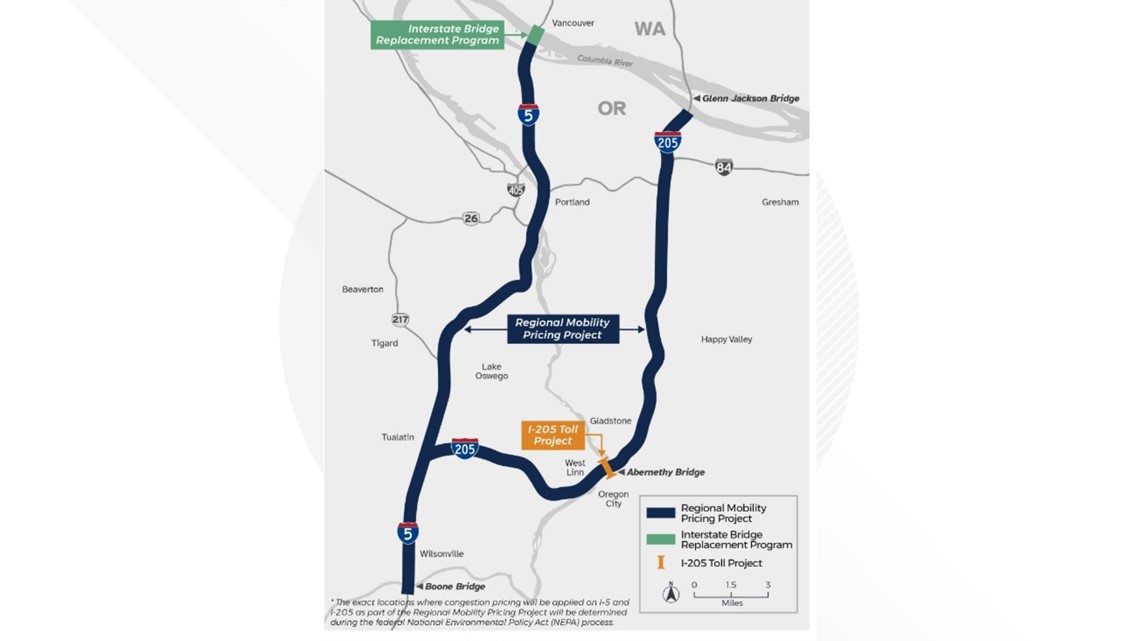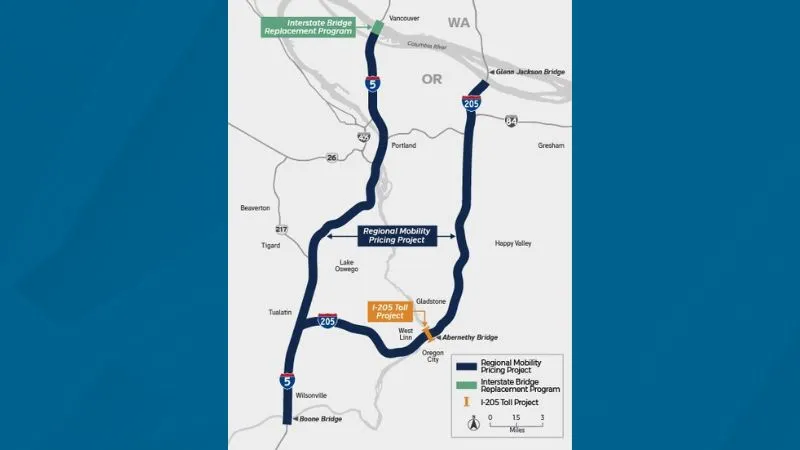Kotek said she still wants Oregon and Washington to use tolls for the planned replacement I-5 bridge, but the broader plan to toll I-5 and I-205 should be scrapped.
PORTLAND, Ore. — Oregon Gov. Tina Kotek appears to be pulling the plug on a plan to toll large sections of Interstate 5 and Interstate 205 in the Portland metro area. She sent a letter to the Oregon Transportation Commission (OTC) on Monday declaring that the Regional Mobility Pricing Plan should be scrapped, The Oregonian first reported.
The plan was one of three separate Portland-area tolling projects currently in development, along with a plan to toll the I-205 Abernethy Bridge to fund an expansion and seismic strengthening project and a plan to toll the I-5 Interstate Bridge to help pay for a replacement. The region-wide tolling scheme was intended as both a revenue driver and a tool to ease freeway traffic through congestion pricing.
The Abernethy tolls were originally intended to start later this year, with the broader Regional Mobility Pricing Plan tolls starting up a few years later, but last year Kotek ordered a moratorium that pushed the start of all new tolls back to at least the start of 2026.


In her Monday letter to OTC Chair Julie Brown and Vice-chair Lee Beyer, Kotek said the “state’s path toward implementing tolling in the Portland metro area is uncertain, at best” and that the challenges associated with the Regional Mobility Pricing Plan “have grown larger than the anticipated benefits.”
“Therefore, I believe it is time to bring the agency’s work on RMPP to an end and delay additional expenditures for implementation of tolling on I-205 to the future when the legislature can further evaluate and provide clearer direction on tolling,” she wrote.
The regional tolling plan dates back to 2017, when the state legislature directed ODOT to begin exploring tolling as a congestion management tool as part of a major transportation funding package, but the plans have drawn increasing public scrutiny and criticism as they’ve come into sharper focus in recent years.
The Oregon Transportation Commission is in charge of setting policy for the state, but Brown, Beyer and Oregon Department of Transportation Director Kris Strickler all released statements in response to Kotek’s letter suggesting that they agree with her line of thinking.
Beyer stated that “metro leadership views on tolling have changed” and “local and regional opposition to tolling makes clear that Oregon is not ready for regional tolling,” and Strickler added that “it is clear the toll program cannot be designed in a way that meets the needs expressed by our local partners while also meeting the needs of Oregonians statewide.”
Brown took a somewhat different tack, declaring that she looked forward to conversations about other funding sources but adding that “while I believe tolling cannot be the only tool to solve all our challenges, as a steward of our state’s transportation system, I believe it should be one of our tools.”
Alternative funding sources
Kotek said part of the reason she previously ordered tolling delayed to 2026 was to give ODOT time to develop an updated finance plan for its regional tolling strategy, and one of the goals would be to make it clear how much the costs for the I-5 Rose Quarter project and Abernethy Bridge projects would depend on toll revenue from the Regional Mobility Pricing Plan.
“The finance plan made clear that rising project costs and uncertainty around future toll revenues meant that the state did not have all the funding needed to proceed with the full strategy as originally envisioned,” she wrote.
ODOT had also been ordered to produce a report on the equity impacts of tolling and the agency’s plan to mitigate the impacts to low-income Portlanders, and Kotek wrote in her letter that the report showed “a toll program which keeps toll rates low enough for working families and raises enough funding for major projects would fail to meet expectations for local project funding and revenue sharing.”
ODOT is facing a broader funding crunch due to the projected decline in revenue from the state’s gas tax, and Kotek said she expects the legislature to tackle that issue in the 2025 session.
“I fully appreciate that canceling and delaying alternative funding tools will only make our challenges greater in the near term, but I am confident that a more robust conversation on funding options will yield greater understanding and direction for our future moving forward,” she wrote.
Wider impacts of the decision
Kotek specified in her letter that she does not want to change the plan to collect tolls for the I-5 Interstate Bridge replacement, and wants the Oregon Transportation Commission and ODOT to keep working with their Washington State counterparts to develop the tolling plan for that project.
However, there is at least one a downstream impact to the project: IBR staff have previously said that they intended to coordinate their tolling program with ODOT so that the I-5 Bridge and Regional Mobility Pricing tolls could have a seamless and shared collection process.
Asked about Kotek’s decision on Monday, the team replied with a statement saying that the Washington State Department of Transportation’s Good To Go tolling program for Seattle-area bridges and tunnels has a “solid track record,” and said IBR will work to “transition operation of tolling on the replacement bridge to WSDOT.”
Kotek’s letter doesn’t directly mention the Abernethy Bridge toll plan, but ODOT lists that plan as a separate project from the broader Regional Mobility Pricing Plan, and construction work on the bridge is already underway, so it seems unlikely that those tolls would be included in the cancellation.
Even so, the West Linn-based advocacy group Vote Before Tolls, which has opposed the regional and I-205 tolling plans and has been working to put an anti-tolling measure on the November ballot, said in a news release that it “declares victory” in response to Kotek’s decision and will switch its focus to a new ballot measure for 2026 instead.
“The tolling battle is not done. The governor’s tolling halt is political maneuvering and likely does not stop all local tolling,” the group’s president, Dean Suhr, said in a statement.
Kotek’s letter comes only days after the U.S. Department of Transportation announced it has awarded a $450 million grant to the I-5 Rose Quarter Improvement Project to help fund a planned “lid” over the freeway to reconnect the historically Black Albina neighborhood that was split in half by the freeway’s original construction, with the grant apparently getting the project back on track after ODOT warned last year that it would stall out in the design phase due to a lack of construction funding.


